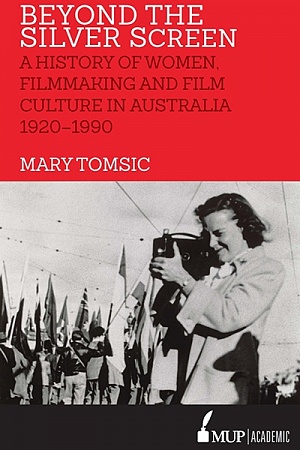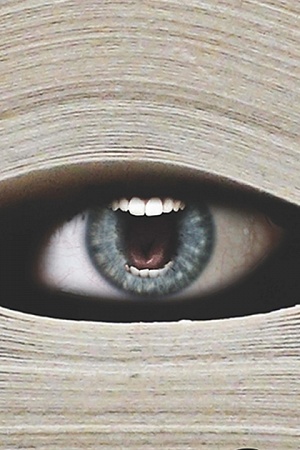News from the Editor's Desk - March 2018

Eyes to the future
As our fortieth birthday celebrations get underway, we have much pleasure in naming Beejay Silcox as the recipient of the ABR Fortieth Birthday Fellowship worth $10,000. Beejay, who first wrote for us in 2016, has quickly become a regular in our pages, and elsewhere. Her short story ‘Slut Trouble’ was commended in the 2016 Jolley Prize. She has lived in more than a dozen cities across three continents and recently completed her MFA in the United States.

Beejay Silcox will contribute several articles and review essays this year, commencing with a survey of magazine culture in our 400th issue (April).
On accepting the Fellowship, she told Advances: ‘We live in an age of outrage, and while much of it seems petty and partisan, some of it is revolutionary. The faults and fault-lines of our political moment offer profound opportunities for literary and critical insight. Below the dysfunction and rage, a new generation of authors is writing the stories that will come to define our time, and us. They’re writing to make sense of the tumult, to unmask dark grievances, lurking cruelties, and wellsprings of change. ABR has an increasingly global reach; it showcases Australian culture to the world, and brings the world back home. The magazine is also a powerful moral compass in Australia’s cultural landscape, from environmental conservation to same-sex marriage to its ongoing support of young writers. It is a privilege to be involved with ABR as it enters its fifth decade, eyes to the future.’
Porter Prize
This year, our valiant judges in the Peter Porter Poetry Prize – John Hawke, Jen Webb, and Bill Manhire – had almost 1,000 poems to assess before choosing the shortlist. It was our largest field to date (the Porter Prize goes back to 2005). And what a shortlist it is, beginning on page 30. There are five poems, and the poets reflect the international nature of this ABR competition. They are Eileen Chong (Sydney), Katherine Healy (Adelaide), LK Holt (Melbourne), Tracey Slaughter (New Zealand), and Nicholas Wong (Hong Kong). The shortlist has been publised in our March 2018 issue.
 The Peter Porter Poetry Prize shortlist (left to right): Eileen Chong (photograph by Charlene Winfred Photography), Katherine Healy (photograph by Ben Liew Photography, Adelaide), LK Holt (photograph by Nicholas Walton-Healey), Tracey Slaughter, Nicholas Wong (photograph by Sum at Grainy Studio)
The Peter Porter Poetry Prize shortlist (left to right): Eileen Chong (photograph by Charlene Winfred Photography), Katherine Healy (photograph by Ben Liew Photography, Adelaide), LK Holt (photograph by Nicholas Walton-Healey), Tracey Slaughter, Nicholas Wong (photograph by Sum at Grainy Studio)
This year’s Porter Prize ceremony will take place at fortyfivedownstairs, 45 Flinders Lane, Melbourne on Monday, 19 March (6 pm). This is a free event, but bookings are essential: This email address is being protected from spambots. You need JavaScript enabled to view it.. After readings from the work of Peter Porter by colleagues and admirers of the late poet, the shortlisted poets will introduce and read their poems. Then Louis Klee – co-winner of the 2017 Porter Prize – will name the overall winner, who will receive $5,000, and the runner-up ($2,000).
RAFT essays
In September 2016 we published the first ABR RAFT Fellowship Essay: ‘How Do We Live with Ourselves? Australia’s national conscience’ by distinguished historian Alan Atkinson. Fourteen months later followed ‘If This Is a Jew: Progressive Judaism around the world’ by Elisabeth Holdsworth, inaugural winner of the Calibre Essay Prize.
 Such was the quality of the field in the 2017 RAFT Fellowship that we decided to award two additional ones: ‘Beyond Songlines’ by Philip Jones (published in September 2017 with support from the ABR Patrons) and Paul Collins’s article ‘God and Caesar in Australia: The close nexus between government and Catholicism’, which we are pleased to be able to publish in this issue as the third ABR RAFT Fellowship.
Such was the quality of the field in the 2017 RAFT Fellowship that we decided to award two additional ones: ‘Beyond Songlines’ by Philip Jones (published in September 2017 with support from the ABR Patrons) and Paul Collins’s article ‘God and Caesar in Australia: The close nexus between government and Catholicism’, which we are pleased to be able to publish in this issue as the third ABR RAFT Fellowship.
We thank the Religious Advancement Foundation Trust for gifting us and readers with these three compelling and very different articles, and for allowing the individual Fellows to devote the requisite time to themes of considerable moment.
Films galore
Our theme in May is Film and Television. The guest editor is James McNamara, a past ABR Fellow whose long article ‘The Golden Age of Television?’ appeared in our April 2015 issue. In addition to a wide range of reviews, commentaries, and articles, we will invite some leading film critics and professionals to nominate their favourite film.
To complement this feature,we want to hear from readers about their favourite films. All you have to do is vote online at: http://bit.ly/2Czft1k. One film per person please, and no television, despite the merits of The West Wing, True Detective, The Sopranos, House of Cards, etc.
There are some fantastic prizes, including a one-year Palace VIP Card thanks to our friends at Palace Films. You have until 7 May to vote, and the overall winner will announced later in May.
Democratic magic
‘The poet’s public’s gone,’ Randall Jarrell wrote cheerfully in ‘Poets, Critics and Readers’, and that was decades ago. But was he right? According to a new volume titled Who Reads Poetry: 50 views from Poetry magazine, lots of people read the stuff – and need it in their lives. They include actors, anthropologists, cartoonists, journalists, art professors, neurosurgeons, photo-conceptual artist, soldiers – even economists.
 Who Reads Poetry (University of Chicago Press/Footprint, $49.99 hb), edited by Fred Sasaki and Don Share (the latter is also Editor of Poetry magazine), features writers such as Roxane Gay, who says gallantly: ‘Even when I am confounded by a poem, it changes my world in some way.’ Christopher Hitchens was an inveterate memoriser of poetry: swathes of Auden, Owen, and the Bible. Predictably, no one writes better than Alex Ross, music critic of The New Yorker. Wallace Stevens he considers ‘the most innately musical of poets’. Ross writes: ‘I’ve long believed that I write what I read, and Stevens is the magic well from which I draw. He teaches the implacable power of the iambic meter, the heft of monosyllables, the democratic magic of the English tongue.’
Who Reads Poetry (University of Chicago Press/Footprint, $49.99 hb), edited by Fred Sasaki and Don Share (the latter is also Editor of Poetry magazine), features writers such as Roxane Gay, who says gallantly: ‘Even when I am confounded by a poem, it changes my world in some way.’ Christopher Hitchens was an inveterate memoriser of poetry: swathes of Auden, Owen, and the Bible. Predictably, no one writes better than Alex Ross, music critic of The New Yorker. Wallace Stevens he considers ‘the most innately musical of poets’. Ross writes: ‘I’ve long believed that I write what I read, and Stevens is the magic well from which I draw. He teaches the implacable power of the iambic meter, the heft of monosyllables, the democratic magic of the English tongue.’
David McCooey, who knows a thing or two about the music of poetry (as well as music), will review Who Reads Poetry for ABR.
And why does poetry retain its unique allure? Judith Wright’s words come to mind: ‘Poetry is one of the last subjective tasks in a time devoted to the object.’
Take two!
ABR now partners with six other periodicals in offering discounted dual subscriptions. They are Griffith Review, Island, The Lifted Brow, Meanjin, Overland, and Westerly. We’re thrilled that so many readers have taken up these special offers. Magazines require lots of things – great writers, good nerves, sound roofs, etc. – but most of all they need subscribers. Without the ‘pleasant twaddle of magazines’ (Henry James), where would our younger writers be – not to mention readers? As Cyril Connolly once wrote: ‘Little magazines are the pollinators of works of art: literary movements and eventually literature itself could not exist without them.’
My name's Muriel Spark
Few authors welcome biographies. Many regard them as invasive, militant, otiose. Muriel Spark was a particularly unlikely subject. A lifelong chameleon, she guarded her privacy and sought to hide details of her fraught relations with her only child. Yet in 1993, out of the blue, she appointed Martin Stannard, whom she did not know, as her official biographer. The timing was odd, for she had just published the first volume of her autobiography, Curriculum Vitae. Spark encouraged Stannard to treat her as though she was already dead – and he did. It was an unhappy autopsy.
 Muriel Spark, (1918–2006)Now, Alan Taylor – Editor of the Scottish Review of Books – has written an affectionate memoir of his friendship with Spark, which began in 1990 and lasted until her death in 2006. Appointment in Arezzo: A friendship with Muriel Spark (Polygon/NewSouth, $29.99 hb) captures her glamour, her inextinguishable Scottishness, and her devotion to writing. In her eighties, Spark was still plotting new novels. She told Taylor: ‘The difficulty of starting a book is getting the tone. It’s like tuning up. It’s very like music, a book, you know. You really have to have a balance, a rhythm. First of all, are you going to tell it in the first person ... If you want to attract a lot of sympathy to a character, the first person is unbeatable. If you’re going to tell it in the third person, then who are you? You’re not really the author. My name’s Muriel Spark and it’s not that.’
Muriel Spark, (1918–2006)Now, Alan Taylor – Editor of the Scottish Review of Books – has written an affectionate memoir of his friendship with Spark, which began in 1990 and lasted until her death in 2006. Appointment in Arezzo: A friendship with Muriel Spark (Polygon/NewSouth, $29.99 hb) captures her glamour, her inextinguishable Scottishness, and her devotion to writing. In her eighties, Spark was still plotting new novels. She told Taylor: ‘The difficulty of starting a book is getting the tone. It’s like tuning up. It’s very like music, a book, you know. You really have to have a balance, a rhythm. First of all, are you going to tell it in the first person ... If you want to attract a lot of sympathy to a character, the first person is unbeatable. If you’re going to tell it in the third person, then who are you? You’re not really the author. My name’s Muriel Spark and it’s not that.’
Such clarity, such un-highfalutin resolve, gave us twenty-two inimitable novels, the short stories (many of them published first in The New Yorker), and some exquisite poems. The latter hardly rate in the adamantine anthologies, yet on her tombstone in Civitella (Spark lived in Tuscany for almost forty years), beneath her name, there is one word: Poeta.









Leave a comment
If you are an ABR subscriber, you will need to sign in to post a comment.
If you have forgotten your sign in details, or if you receive an error message when trying to submit your comment, please email your comment (and the name of the article to which it relates) to ABR Comments. We will review your comment and, subject to approval, we will post it under your name.
Please note that all comments must be approved by ABR and comply with our Terms & Conditions.